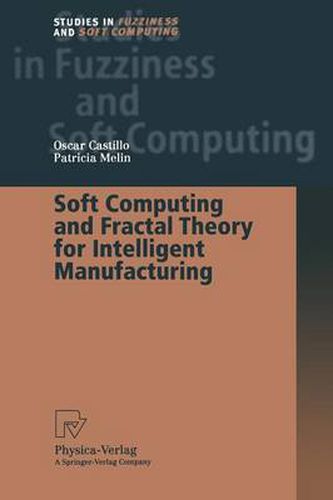Readings Newsletter
Become a Readings Member to make your shopping experience even easier.
Sign in or sign up for free!
You’re not far away from qualifying for FREE standard shipping within Australia
You’ve qualified for FREE standard shipping within Australia
The cart is loading…






This title is printed to order. This book may have been self-published. If so, we cannot guarantee the quality of the content. In the main most books will have gone through the editing process however some may not. We therefore suggest that you be aware of this before ordering this book. If in doubt check either the author or publisher’s details as we are unable to accept any returns unless they are faulty. Please contact us if you have any questions.
We describe in this book, new methods for intelligent manufacturing using soft computing techniques and fractal theory. Soft Computing (SC) consists of several computing paradigms, including fuzzy logic, neural networks, and genetic algorithms, which can be used to produce powerful hybrid intelligent systems. Fractal theory provides us with the mathematical tools to understand the geometrical complexity of natural objects and can be used for identification and modeling purposes. Combining SC techniques with fractal theory, we can take advantage of the intelligence provided by the computer methods and also take advantage of the descriptive power of the fractal mathematical tools. Industrial manufacturing systems can be considered as non-linear dynamical systems, and as a consequence can have highly complex dynamic behaviors. For this reason, the need for computational intelligence in these manufacturing systems has now been well recognized. We consider in this book the concept of intelligent manufacturing as the application of soft computing techniques and fractal theory for achieving the goals of manufacturing, which are production planning and control, monitoring and diagnosis of faults, and automated quality control. As a prelude, we provide a brief overview of the existing methodologies in Soft Computing. We then describe our own approach in dealing with the problems in achieving intelligent manufacturing. Our particular point of view is that to really achieve intelligent manufacturing in real-world applications we need to use SC techniques and fractal theory.
$9.00 standard shipping within Australia
FREE standard shipping within Australia for orders over $100.00
Express & International shipping calculated at checkout
This title is printed to order. This book may have been self-published. If so, we cannot guarantee the quality of the content. In the main most books will have gone through the editing process however some may not. We therefore suggest that you be aware of this before ordering this book. If in doubt check either the author or publisher’s details as we are unable to accept any returns unless they are faulty. Please contact us if you have any questions.
We describe in this book, new methods for intelligent manufacturing using soft computing techniques and fractal theory. Soft Computing (SC) consists of several computing paradigms, including fuzzy logic, neural networks, and genetic algorithms, which can be used to produce powerful hybrid intelligent systems. Fractal theory provides us with the mathematical tools to understand the geometrical complexity of natural objects and can be used for identification and modeling purposes. Combining SC techniques with fractal theory, we can take advantage of the intelligence provided by the computer methods and also take advantage of the descriptive power of the fractal mathematical tools. Industrial manufacturing systems can be considered as non-linear dynamical systems, and as a consequence can have highly complex dynamic behaviors. For this reason, the need for computational intelligence in these manufacturing systems has now been well recognized. We consider in this book the concept of intelligent manufacturing as the application of soft computing techniques and fractal theory for achieving the goals of manufacturing, which are production planning and control, monitoring and diagnosis of faults, and automated quality control. As a prelude, we provide a brief overview of the existing methodologies in Soft Computing. We then describe our own approach in dealing with the problems in achieving intelligent manufacturing. Our particular point of view is that to really achieve intelligent manufacturing in real-world applications we need to use SC techniques and fractal theory.